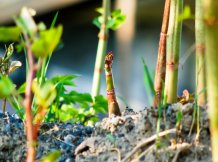Articles

Image: Shutterstock.
Northern exposure: ESI researchers in Edinburgh
A strong cohort of ESI researchers will be heading to Edinburgh in December to contribute to The British Ecological Society’s 2015 Annual Meeting.
The British Ecological Society (BES) is committed to bringing greater understanding of ecology, and its importance, to a wider audience. By generating, communicating and promoting ecological knowledge, it aims to see a world inspired, informed and influenced by ecology. Its annual meeting is one of the activities which contributes to these efforts, alongside publishing internationally-renowned journals, funding grant schemes, education and policy work as well as organising a variety of events.
Seven ESI staff and students – a mix of PhD students and post-doctoral researchers – will be contributing to this exchange of information and ideas.
will present on ‘Assessing the social feasibility of invasive species management’ in the Invasive Species session , while Beth Robinson’s topic , ‘Perceived versus actual risks of the natural world; Japanese knotweed in domestic gardens’ is scheduled for the Ecology and Society session.
Dr Elvire Bestion’s subject is ‘Live fast, die young: experimental evidence of population extinction risk due to climate change’, which will falls into the Applied Ecology and Conservation category.
In the Urban Ecology session, Dr Jonathan Bennie – from the ESI’s ECOLIGHT group – will talk about ‘Top-down and bottom-up effects of artificial light at night on a grassland ecosystem’. ’s work on ‘Impacts of disturbance in tropical habitats: evidence from papyrus avifauna in Uganda’ will be heard in the Conservation Biology session, while is presenting, in the Global Change Ecology session, ‘Rapid evolution of metabolic traits explains thermal adaptation in phytoplankton’. This is where Dr Andrew Suggitt will also talk, on why 'Microclimatic buffering reduces extinction risk from climate change'.
Dr Andrew Suggitt said: "The BES Annual Meeting is a great opportunity for us at the ESI to build bridges with other ecologists and share our latest findings. Although the backbone of the meeting is the large programme of talk sessions running in parallel, there is also ample opportunity to swap ideas over coffee breaks, lunch or dinner, and many successful collaborations begin this way. We are therefore sending a strong group of ESI speakers to Edinburgh, representing the rich variety and prominence of the work we do."
Date: 6 November 2015
